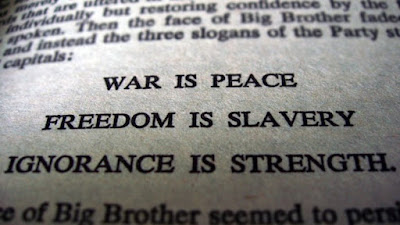"It turns out that copy really matters," a CEO recently confessed on LinkedIn.
Until he was forced by circumstance to roll up his sleeves and execute, Adam Schoenfeld had been only strategy-minded.
"I didn't get it before," Schoenfeld says. "Now I've come to believe that the best marketing teams nail the details. They get the big picture for sure. But their magic is in the details!"
Duh.
Why don't more executives realize execution matters? Particularly in copywriting.
The late, great marketer Herschell Gordon Lewis said, "The picking of nits is what copywriting that sells is all about."
Lewis was right, of course: nit-picking's the activity distinguishing copy that sells from copy that fails.
To wit, the following example.
The copywriter here indeed fails—big time. Perhaps he's too self-absorbed to "walk in prospects' shoes" (in this case, members of the military). Or maybe he's green. Or maybe he's just lazy, content to copy and paste from an internal brief. In any event, he isn't picky.
Association Members are entitled to specially negotiated Group Discounts not available to the general public. We continue to leverage the vast purchasing power of hundreds of thousands of Association Members to negotiate exclusive Group Discounts. You’ll save big on select Apple and Dell computers, hotel stays, car rentals, active-lifestyle apparel, outdoor products, and more. Association Members also save with FREE access to “concierge-style” travel services.
What's wrong with this copy?
Association Members are entitled...
"Entitled" is a politically-loaded word, particularly among right-leaning folks. (How many members of the military do you know who lean left?)
Members receive would remove the connotation.
...to specially negotiated Group Discounts...
"Specially negotiated" is redundant. "Group Discounts" is shop talk.
Members receive savings not available to the general public would work better.
We continue to leverage the vast purchasing power of hundreds of thousands of Association Members...
More shop talk, plus a self-centered standpoint—and an awfully vague claim.
More than 370,000 members take advantage of these savings every year would work better.
You’ll save big on select Apple and Dell computers, hotel stays, car rentals, active-lifestyle apparel, outdoor products, and more...
Even more shop talk, plus erratic name-dropping. Consumers don't know what "hotel stays," "active-lifestyle apparel," or "outdoor products" are. And why aren't brands named for any of those product categories, as they are for computers? Are those offerings crap?
You’ll save big on computers, hotel rooms, rental cars, clothing, outdoor and sports goods, and more... would work better.
Association Members also save with FREE access to “concierge-style” travel services...
Shop talk. And what does "concierge-style" mean, anyway?
Members can also use our free travel service would work better.
Now, our perhaps-lazy copywriter would string together the revised sentences and call it quits.
Members receive savings not available to the general public. More than 370,000 of them take advantage of these savings every year. Members save big on computers, hotel rooms, rental cars, clothing, outdoor and sports goods, and more. Members can also use our free travel service.
But why settle for pedestrian copy? Why not tighten it and—more importantly—put to work the indisputable power of the word "you?"
Membership lets you take full advantage of deep, member-only discounts on purchases of things like clothing, computers, outdoor and sports goods, hotel rooms, rental cars, and more. You also get to use our concierge service to plan trips. It’s like having your own personal travel agent.
Stay picky, my friend. Execution matters.
























